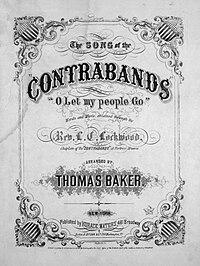
Information to change the world | |
Find Topics, Titles, Names related to your query |

Information to change the world | |
Find Topics, Titles, Names related to your query |
|
|
Go Down Moses
|
||||||||||||||||||||||||||
| "Go Down, Moses" | |
| Music by | Traditional |
|---|---|
| Form | Negro spiritual |
| Original artist | Fisk Jubilee Singers (Earliest attested) |
 |
|
| Problems listening to this file? See media help. | |
"Go Down Moses" is an American Negro spiritual. It describes events in the Old Testament of the Bible, specifically Exodus 7:26: "And the Lord spoke unto Moses, go unto Pharaoh, and say unto him, thus saith the Lord, Let my people go, that they may serve me", in which God commands Moses to demand the release of the Israelites from bondage in Egypt. The opening verse as published by the Jubilee Singers in 1872:
In the song "Israel" represents the African-American slaves while "Egypt" and "Pharaoh" represent the slavemaster.
Going "down" to Egypt is derived from the Biblical origin, where Egypt is consistently perceived as being "below" other lands, with going to Egypt being "down" [1] while going away from Egypt is "up".[2] In the context of American slavery, this ancient sense of "down" converged with the concept of "down the river" (the Mississippi), where slaves' conditions were notoriously worse, a situation which left the idiom "sell [someone] down the river" in present-day English.[3]
Contents |
| "Oh! Let My People Go" (The Song of the Contrabands) |
|
 Cover of sheet music, 1862 |
|
| Music by | Traditional |
|---|---|
| Published | 1862 |
| Form | Negro spiritual |
| Original artist | Contrabands |
Although usually thought of as a spiritual, the earliest recorded use of the song was as a rallying anthem for the Contrabands at Fort Monroe sometime before July 1862. Early authorities presumed it was composed by them.[4] Sheet music was soon after published, titled "Oh! Let My People Go: The Song of the Contrabands" and arranged by Horace Waters. L.C. Lockwood, chaplain of the Contrabands, stated in the sheet music the song was from Virginia, dating from about 1853.[5] The opening verse, as recorded by the Lockwood, is:
The song was made famous by Paul Robeson whose voice, deep and resonant as it was, was said by some to have attained the status of the voice of God. On February 7, 1958, the song was recorded in New York City, and sung by Louis Armstrong with Sy Oliver's Orchestra.
It is also one of the spirituals used in the oratorio A Child of Our Time by the English composer Michael Tippett.
William Faulkner titled his novel Go Down, Moses after the song.
A Hebrew translation of the song is a common element in the Passover seder in Israel.
A reference is made to the song in the film Ferris Bueller's Day Off when a bed-ridden Cameron sings, "When Cameron was in Egypt land, let my Cameron go!"
Sung by Will Smith's character to Carlton Banks (played by Alfonso Ribeiro) in an episode of The Fresh Prince of Bel-Air (Smith sang the first two lines, Banks sullenly providing the refrain, then a prisoner scares them both by singing the final four lines in an operatic voice.)
Also sung by Gregory Miller (played by Sidney Poitier) in the 1955 film Blackboard Jungle.
The song was recorded by Deep River Boys in Oslo on September 26, 1960. It was released on the extended play Negro Spirituals No. 3 (HMV 7EGN 39).
Also sung by James Lewis on his American Idol audition in 2008.
Also sung by Jess Lee Brooks in the 1941 Preston Sturges film Sullivan's Travels.
The song, or a modified version of it, has been used in the Roger Jones musical 'From Pharaoh to Freedom'.
Also sung by Della Reese in Episode 424, "Elijah", of Touched By An Angel while Bruce Davison sang "Eliyahu."
Related topics in the Connexions Subject Index
Alternatives –
Left History –
Libraries & Archives –
Social Change –
This article is based on one or more articles in Wikipedia, with modifications and additional content contributed by
Connexions editors. This article, and any information from Wikipedia, is covered by a
Creative Commons Attribution-Sharealike 3.0 Unported License (CC-BY-SA) and the
GNU Free Documentation
License (GFDL).
We welcome your help in improving and expanding the content of Connexipedia articles, and in correcting errors. Connexipedia is not a wiki: please contact Connexions by email if you wish to contribute. We are also looking for contributors interested in writing articles on topics, persons, events and organizations related to social justice and the history of social change movements.
For more information contact Connexions



